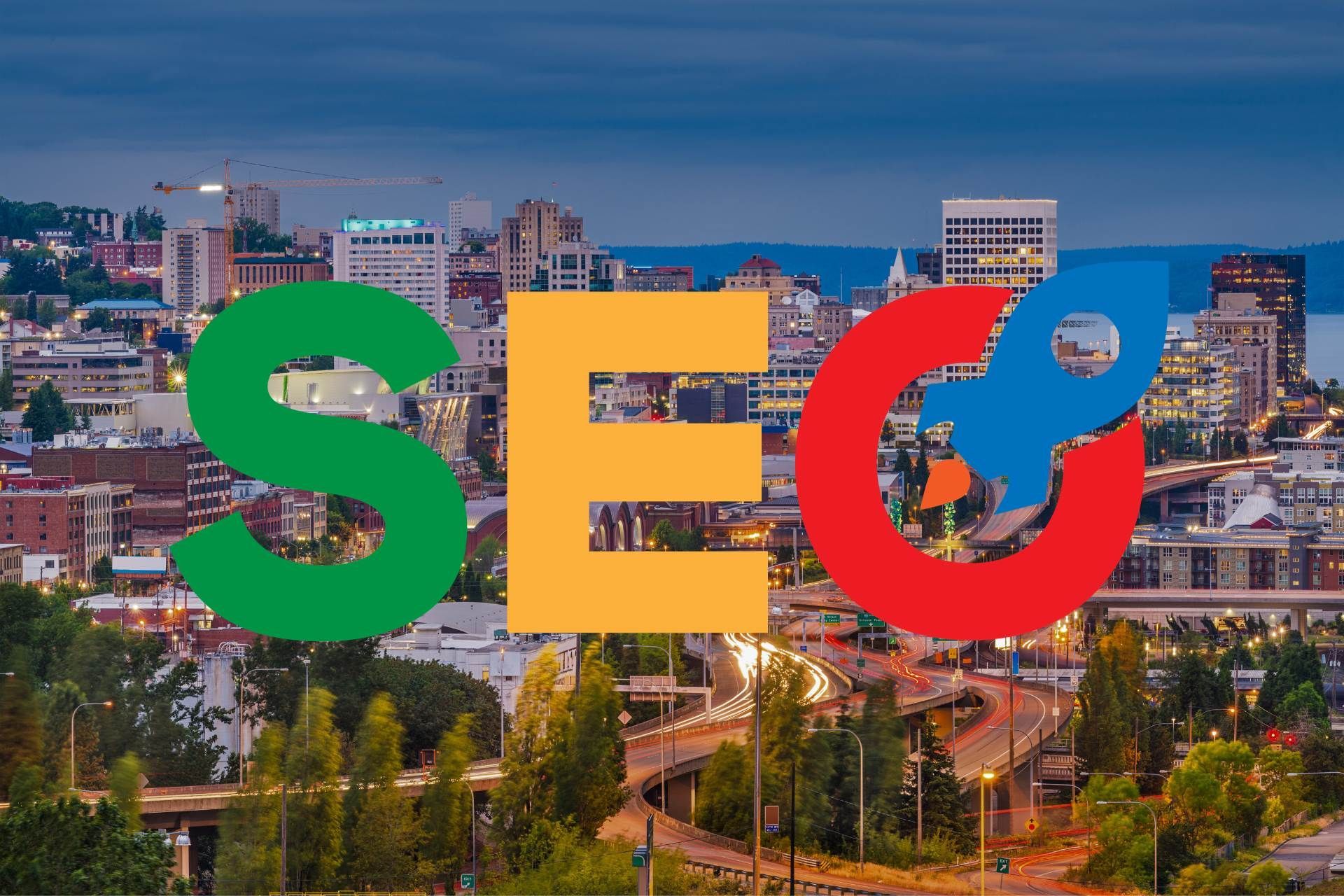Blog Layout
Local SEO: How to Rank Higher in Your Local Area
Amanda Pantano • November 6, 2023
In the digital age, local businesses have a world of opportunity at their fingertips. Yet, the competition in the local marketplace is fierce. If you're a business owner looking to stand out in your local area, leveraging local SEO (Search Engine Optimization) is key. Let's dive into the essentials of local SEO and uncover actionable strategies to boost your local rankings.
What is Local SEO?
Local SEO is a subset of traditional SEO. While SEO focuses on improving a website's visibility on a national or global scale, local SEO aims to capture traffic from searchers in a specific location. This could involve people looking for a nearby food truck, roofer, or caterer.
Why is Local SEO Essential?
With the advent of mobile devices, local searches have skyrocketed. According to Google, "near me" searches have grown by over 500% in the past few years. If your business isn't optimized for local search, you're missing out on a significant chunk of potential customers.
How to Boost Your Local SEO:
1. Claim Your Google Business Profile:
This free tool from Google allows businesses to manage their online presence across Google, including Search and Maps. Ensure your listing has accurate details, high-quality images, and regular posts.
2. Optimize for Mobile:
Many local searches are done on-the-go from mobile devices. Ensure your website is mobile-friendly, with a responsive design and fast loading times.
3. Gather Reviews:
Encourage satisfied customers to leave reviews on Google and other relevant platforms. Positive reviews not only enhance your credibility but also send signals to search engines about your business's relevance.
4. Localize Your Content:
Ensure your website includes content relevant to the local audience. This can include blog posts about local events, testimonials from local customers, or location-specific landing pages.
5. Ensure NAP Consistency:
Your business's Name, Address, and Phone Number (NAP) should be consistent across all online platforms. Discrepancies can confuse search engines and reduce trustworthiness.
6. Build Local Backlinks:
Having local organizations, blogs, or news sites link back to your website can significantly boost local SEO. Consider collaborating with community events, local charities, or sponsoring local activities.
7. Use Local Keywords:
Integrate keywords that are relevant to your locality. For instance, instead of targeting "best coffee shop," aim for "best coffee shop in [your city/neighborhood]."
8. Engage on Social Media:
Active engagement in local groups or discussions on platforms like Facebook, Twitter, or LinkedIn can increase your local presence.
Local SEO is no longer an optional strategy—it's a necessity for businesses aiming to dominate their local market. By implementing these strategies, you'll be on your way to securing top spots in local search results, driving more foot traffic, and boosting your business's growth.
Do you want to know how you rank in your area?
Contact us
for a comprehensive SEO audit and report to help you determine where you need to start with your SEO efforts!

By Clayton Pantano
•
March 13, 2025
Introduction to Puyallup Digital Marketing The digital landscape is constantly evolving, especially in growing communities like Puyallup. As businesses in this vibrant city seek to expand their online footprint, finding the right Puyallup marketing agency becomes crucial for sustainable growth and competitive advantage. At Entrust Marketing, we've witnessed firsthand how proper digital strategies have revitalized local Puyallup businesses - from the charming downtown storefronts to the expanding commercial developments throughout Pierce County. Our journey as a premier Puyallup digital marketing agency has been built on understanding the unique challenges and opportunities within this special community.

By Clayton Pantano
•
February 24, 2025
Successful social media marketing requires a clear strategy, a deep understanding of your audience, and the proper execution. That’s where we come in. As leaders in social media marketing and social media management, we’ve helped businesses like yours create impactful online presences that drive real business growth

By Clayton Pantano
•
June 1, 2024
As the owner of Entrust Marketing, I've had the pleasure of working with numerous businesses in Tacoma, helping them navigate the ever-evolving digital landscape. Tacoma is a vibrant city with a thriving business community, and having a strong digital presence is crucial for success. That's where Entrust Marketing comes in – we are dedicated to providing top-notch digital marketing services tailored to the unique needs of Tacoma businesses. Stick around for a few while I talk about what we've built at Entrust Marketing and how we've become a leading digital marketing agency in Tacoma (and all around Puget Sound.)

By Clayton Pantano
•
March 16, 2024
Recently, Hootsuite published a wildly informative and interesting study titled “The Social Media Consumer Report.” As I read it, I was blown away by the depth of the analysis being provided. It both proved and disproved theories that I’ve been guilty of holding. As I walked away from it, I felt this was worth sharing to anyone willing to read my takeaways.

By Amanda Pantano
•
February 23, 2024
Local SEO is a crucial component of any small business's digital marketing strategy, especially for those looking to attract more foot traffic and increase visibility within their local community. With the right approach, small businesses can effectively compete with larger companies and even dominate local search results. This blog post will provide actionable tips and strategies to help small businesses improve their local SEO and capture the attention of potential customers in their area.

By Amanda Pantano
•
February 22, 2024
In the ever-evolving digital landscape, the importance of a quality website for businesses cannot be overstated. As we step into 2024, this significance only amplifies, with the digital frontier continuing to expand and consumer behaviors increasingly shifting towards online platforms for shopping, information gathering, and service acquisition. A quality website now serves not just as a digital business card but as a central hub for your brand's online presence, customer engagement, and conversion activities.

By Amanda Pantano
•
January 30, 2024
In the ever-evolving landscape of social media marketing, one principle has remained consistently at the forefront: the importance of authenticity. As we make our way through the digital era where content is king, authenticity has emerged as its queen. This article delves into why authenticity matters in social media marketing, how it influences consumer behavior, and practical strategies for brands to harness its power.

By Amanda Pantano
•
January 30, 2024
In today's digital age, social media has evolved from a novel communication tool into a pivotal marketing and branding platform for businesses of all sizes. With the vast and ever-growing digital landscape, managing social media can become overwhelming, especially for businesses with limited resources or expertise in this area. This is where outsourcing social media management comes into play, offering a plethora of benefits that can enhance a business's online presence, engage its audience, and drive growth. In this article, we will explore the key reasons why outsourcing social media management is a strategic move for businesses looking to thrive in the digital landscape.

By Clayton Pantano
•
January 3, 2024
As time progresses, food trucks need more than just delicious cuisine to stand out. They need a robust online presence, and this is where social media marketing, both organic and paid, plays a pivotal role. At Entrust Marketing, we specialize in catapulting food trucks to digital prominence, transforming them into local sensations.

By Amanda Pantano
•
December 7, 2023
For event companies in Tacoma, Washington, a strong online presence is essential to attract clients and stand out in a competitive market. Search Engine Optimization (SEO) plays a pivotal role in achieving this. This comprehensive guide explores how Tacoma-based event companies can leverage SEO to enhance their visibility and grow their business.

By Clayton Pantano
•
December 5, 2023
Over time, social media has emerged as a crucial platform for businesses to connect with customers, promote their brand, and drive growth. For small businesses, it offers a unique opportunity to compete on a level playing field with larger competitors. You might be wondering, how do I make the most out of social media? Is it required for my small business? Should I even spend the time developing a social media strategy? This comprehensive guide aims to demystify social media marketing, providing you with the strategies and tools needed to harness its power effectively.

By Amanda Pantano
•
November 30, 2023
In the age of digital connectivity, social media is no longer just a platform for socializing; it’s a pivotal tool for businesses to engage with their audience. For businesses in Tacoma, Washington, a city known for its vibrant culture and diverse population, leveraging social media is essential. But how can local businesses tap into this dynamic market effectively through social media? Let’s explore.

By Clayton Pantano
•
November 24, 2023
In the digital era, visibility is paramount for business success, especially in a competitive market like Tacoma, Washington . Search Engine Optimization (SEO) is the key to ensuring your business stands out online. This comprehensive guide will walk you through the essential SEO strategies to enhance your Tacoma business's online presence.

By Clayton Pantano
•
November 22, 2023
In the digital age, social media advertising has become a crucial tool for businesses to reach their target audience effectively. For businesses in Tacoma, Washington, where the market is as diverse as its landscape, targeted social media advertising can be especially powerful. This guide explores how Tacoma businesses can leverage social media ads to maximize their impact.

By Clayton Pantano
•
September 15, 2023
In today's digital age, social media has become a crucial aspect of any business's marketing strategy. It is a powerful tool that can help you connect with your audience, build brand awareness, and ultimately drive sales. However, managing your business's social media presence is no small task. It involves creating engaging content, responding to customer inquiries, analyzing data, and staying up-to-date with the latest trends. That's why many businesses choose to hire a social media manager or a social media management agency to handle these tasks. But how do you choose the right one for your business? Here are some key factors to consider.

By Clayton Pantano
•
July 26, 2023
In the bustling and growing world of food truck businesses, standing out from the competition isn't just about having the tastiest menu – it's about having a robust social media strategy. A strong presence on social media platforms for your food truck can exponentially increase your reach, boost customer engagement, and drive foot traffic to your truck. In this guide, we'll provide key steps and some of our favorite tips to create a winning social media strategy for your food truck.

By Clayton Pantano
•
July 26, 2023
As a food truck owner, you know that delicious cuisine is only one piece of the success puzzle. In today's digital world, your online presence can make or break your business. That's where Instagram comes into play. With over 1 billion monthly active users, Instagram is a powerful tool for connecting with customers and growing your brand. Entrust Marketing, the leading authority in food truck marketing, is here to share expert tips on how to master Instagram for your food truck business.

By Clayton Pantano
•
July 26, 2023
Social media has become a common part of our lives, as it continues to shape the way we communicate, interact, and make decisions in our every day lives. For businesses in Tacoma, social media marketing offers an invaluable opportunity to connect with customers, boost brand awareness, and grow your business both in this city and outside of the city limits. With social media marketing, it's possible to develop a presence that attracts people from all around King and Pierce County. In this blog post, we'll explore the benefits of social media marketing for Tacoma businesses and share tips on how to create a successful social media strategy.

Let's Connect!
Entrust Marketing helps service-based businesses grow with high-value, results-driven marketing. From social media and SEO to paid advertising, we handle the details so you can focus on what matters most. No confusion, no hassle—just real marketing that works. Let’s talk!
clayton@entrustmarketingwa.com
253-455-3273



















